Arriving here from Belgrade, New Year’s Day was a tired affair. We slept for most of it.
On the way from the central station to my friend Adam’s apartment, one of the first things I noticed was the amount of homeless people sleeping in underpasses. At least they are sheltered from the worst weather elements here, but it’s still incredibly cold and the problem stares everyone in the face – why hasn’t something been done?
Speaking of the weather, it was terrible. Monotonous raindrops pattered on the apartment windows for two days, meaning I didn’t really want to get up and go out at all. It was like being back in England. Perhaps tiredness from so much travelling was starting to accumulate – it had been around three days with hardly any sleep, so I’m sure that was playing a part too.
When the rain finally seemed to ease up, I went for a walk around the nearby area in search of food. It took a very long time to find the local supermarket, a modest Spar branch; it’s true I didn’t know where to look, but you would have thought there to be quite a few possibilities on the main streets. As I came out with a bag full of supplies, purchased for a ridiculously low price, the heavens opened once again and I hurried back for some dinner.
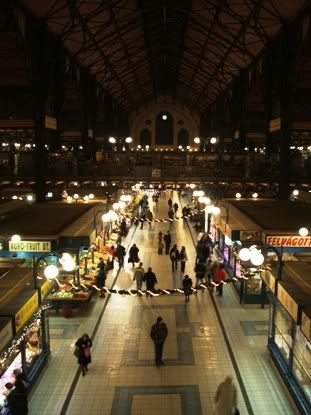
The next day it was a bit nicer outside, so Adam gave me a guided tour round some of
Budapest’s main places. We started off at the cavernous market hall, which I should have visited the previous evening – this seemed to be the centre of local shopping activities. Even quite late in the day it was still pretty busy (peak time is apparently early mornings), with stallholders selling a variety of products including food, drink, clothes and tacky souvenirs. This must be why it was so hard to find a commercial supermarket; everyone comes here instead.
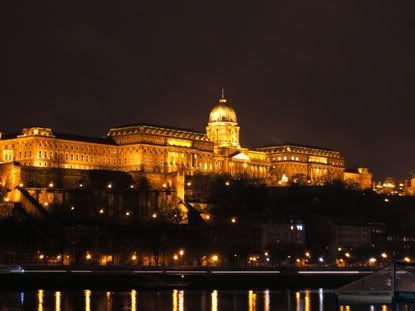
After this we headed to the
Danube riverside, where some of the city’s illuminated attractions can be seen.
Budapest life in times gone by was heavily dependent on the river and it also has some spectacular bridges. The first thing which caught my eye was a large castle, lit dramatically on a hill. But one of the finest old buildings, the Hungarian Parliament, was hardly visible at all; only the middle dome section had proper lighting and this was a great disappointment. I could see similarities in design to the British one, so it would have looked great.
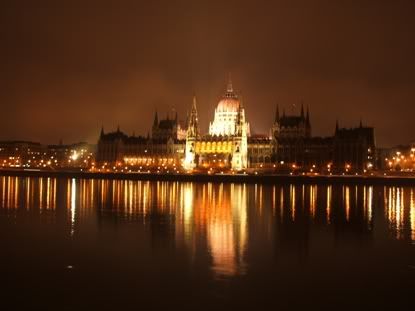 The Hungarian Parliament
The Hungarian Parliament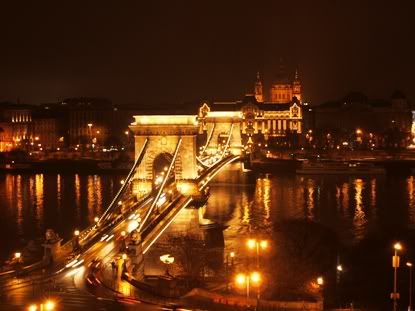 One of Budapest's grand bridges from a high viewpoint
One of Budapest's grand bridges from a high viewpointSoon after we arrived at another famous landmark: Heroes’ Square, the largest in
Budapest. It was empty apart from a few people wandering around, a couple of which asked us about restaurants in the area, and one man with a camera and large tripod. The main column has a statue of the Archangel Gabriel at its summit and the others surrounding it are eminent figures from Hungarian history. The whole thing looked great at night too.
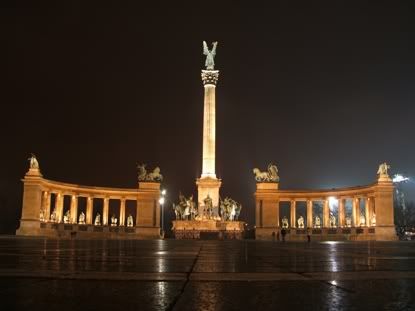
Walking through the chilly streets, we had to be very careful watching out for dogs' natural waste.
Budapest has an unusually high ratio of pets to population: something like 600,000 animals for under two million people. And the owners aren’t as well-trained as they are at home either, which means you’ve got to watch out – especially when it’s dark.
We had dinner and then moved on to a very interesting nightspot, the ‘Clutch’. It’s a spacious bar/concert venue which used to be a carwash. On one side was the bar itself and there were lots of little tables with chairs scattered around, nearly all occupied even on a Tuesday evening. The vibrant buzz of people speaking created a nice social atmosphere. Foosball tables were everywhere with queues to play – it’s the national Hungarian activity in places like this and everyone’s really good.
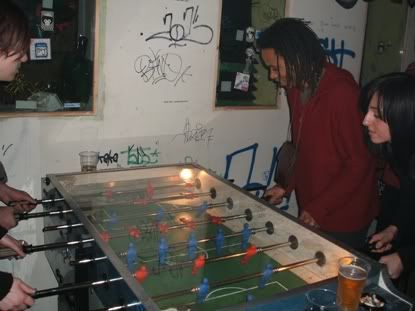
There was a gig taking place that evening, in a smaller room adjacent to the main area. It was a French band named ‘Les Touffes Kretins’, which featured a couple of percussionists, many brass instruments including a huge sousaphone, one guitarist and someone on the banjo. They played a crazy mixture of reggae, ska, jazz, hiphop (band members took it in turns to MC into megaphones) and just about every other musical style there is. What an amazing group, they really got everyone involved and each musician brought their own creativity in with soloing.
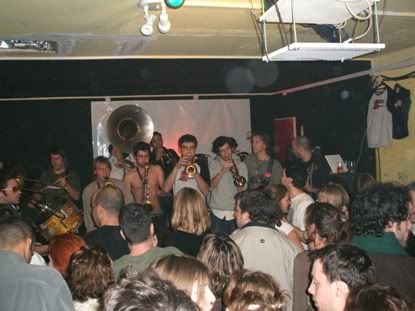
Something negative I discovered during this trip had to do with the English people and our language. Adam is currently studying for a teaching certificate and had lots of work to do for tests when I was staying. So one evening he asked me to help out with revision. We then discovered that I didn’t know anything about the stuff he was supposed to learn, which included loads of grammatical terms I’d never even heard of like ‘morpheme’.
What’s going on? I was never taught anything beyond the very basic principles of English grammar; it really annoys me not to be able to answer advanced questions. It’s not like I had a bad education or don’t know how to speak the language – it’s just that I don’t understand why things are the way they come out, for example in sentence structures. I think this also links to the well-known fact that the British are terrible at learning other languages; I wonder what percentage of this country can honestly say they could get by with another tongue. But if we don’t even know how to speak our own language, this isn’t really surprising. I think my German would definitely be better now if I’d learnt proper English grammar as a child. The Hungarians do this with their language, so why can’t we? It’s clearly a big hidden flaw in the education system and something has to be done.
Hungarian is one of the languages in the small group of random ones, which are unrelated to any in surrounding countries. It is joined by Finnish and Estonian in this elite selection, but they are only similar in terms of grammar as far as I know. The only two words I managed to pick up were yes and no – ‘igen’ and ‘nem’ – as well as a couple of curses that some would argue are equally useful.
Another thing I discovered was the term “conference tourism”. I’d never heard it before, but I can think of no better words to describe what I’ve been doing on and off for the past six months.
I was due to leave Budapest on January 6, taking an EasyJet flight to Gatwick. When that day came I could feel a strange sensation inside. It was like the last few weeks had just been a blur; I’d travelled through 15 countries and this was the end of it all. Disembarking in Vilnius on November 28 seemed both like it had happened yesterday and, at the same time, felt a bit like a distant memory.
The same applies to the last six months of my life, since I finished secondary school with my last exam on June 30. It’s been nearly constant travel since then. Countless awesome people, places and experiences later we’re in 2006 – a new year which will bring new beginnings for me. But to be at home now, knowing there won’t be any more expeditions during the foreseeable future, is very weird. I’m not sure I like it. I’m not sure I even like being at home anymore.
Labels: Europe, travel












0 Comments:
Post a Comment
<< Home